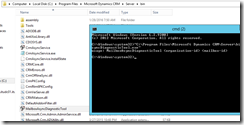
tl;dr When incoming email gets rejected, check if you have records in mail-enabled entities (contacts, accounts, queues, and system users OOB) using the same email address. I’ve done this today Set up a hybrid server-side sync for a customer. (There are some gaps in the docs, this is a recommended reading companion.) Add a support […]
 of the
of the


